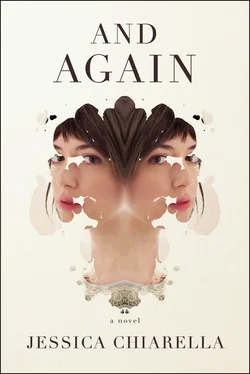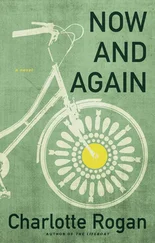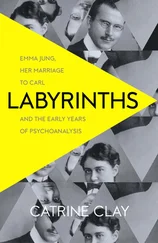I told Penny about the kiss when she came to visit me on Friday afternoon, bracing myself for the hardness of her expression even as I let the words spill out between us. She chewed on the inside of her cheek, the way she does when she’s working on a painting that she can’t get quite right.
“Who is this guy?” she asked.
“Just a guy from my group. No one, really.” I pause, trying to think of something that will mitigate the awfulness of it. “He’s kind of a dirtbag, actually.” Nothing changes in her face in response to this, and I can’t tell if I’ve made things better or worse by saying it. Finally she releases her mouth back to its rightful shape and turns the soft pink of her palms to the sky.
“I don’t know, Han. I’m not going to be the one to tell you how you should or shouldn’t process all of this.”
It made me feel worse, I think, that she didn’t scold me, or reassure me. It made me feel even more adrift.
By the next Thursday I know any chance I’ve had of driving David Jenkins from my mind has been futile. Because there he is, ten minutes late, taking the seat across from me in our support group.
“Does anyone feel like they got the wrong body?” he asks, cradling a cup of hot cocoa between his hands. It seemed childish and silly to me, when we showed up to last week’s meeting, to find packets of Swiss Miss and a carafe of boiling water on the conference room table. But now we all drink it, tearing open the paper packets with our teeth and stirring lumpy chocolate powder into the piping hot water. It’s a good excuse to ignore one another for those first few awkward minutes, until someone gets up the nerve to speak.
“I mean, maybe not the wrong one, obviously, but, maybe the knockoff version?” David continues. Linda nods a little, but says nothing. Connie seems to be paying more attention to a chip in her nail polish than to what David is saying. Dr. Bernard scribbles on his notepad before looking up.
“You think that this body is somehow inferior to the one that you had before?” Dr. Bernard asks.
“What I mean, doc, is that I can’t prove this is my body,” David says. We’ve all adopted Connie’s habit of calling Dr. Bernard “doc” because it seems to annoy him quite a bit. It feels kind of good, to have someone to gang up on. Six weeks, I think. Six weeks was all it took to go from strangers to a merry little band of rebellious clones. “Everything I could point to,” David continues, “everything that I could identify as mine is gone. That’s a lot of history to lose.”
I brush my hand over my forehead and it’s perfectly smooth, though I persist in trying to find the little indent that used to be there. It was a scar from when I went head-first into a rocking chair as a toddler. I was too little to remember it, but my mother always seemed to enjoy recounting that particularly harrowing bit of childhood lore. Now the last bit of evidence is gone. The memory belongs only to my mother. If she forgets it, it will be like that unfortunate afternoon never even happened at all. So I know what David means about losing history.
“You know, even our fingerprints are different now,” I say, examining the pads of my fingers, as if I can tell that the patterns etched into my skin are altered. It occurs to me, again, how little I knew of the body I left. “They’re not genetic, fingerprints. They’re developed in utero, environmental, so there’s no way they could be the same.”
“I guess if you ever wanted to rob a bank, the time is now,” Connie quips.
“I can’t stop thinking of what they’ve done with our other bodies,” Linda says. “What does it mean to donate it to science? Is it just sitting in a refrigerated drawer somewhere? Or, did they cut it to pieces like those fetal pigs we had to dissect in high school? Did they burn it? I know I shouldn’t be thinking about it, but it still feels like me. It’s still enough of me that I care what happens to it.”
We all look at her, flabbergasted, because this is the most any of us has ever heard Linda say. She’s twisting a piece of Kleenex between her fingers as she speaks. I wonder why Linda cares what they did with it, after eight years of being trapped within that defective vegetable of a body. I would expect her to be happy to be rid of it. But now that she’s said something, I feel it too, a sense of disconnection from my old self, like an amputee that still feels itching in a phantom limb. Though that body is pocked with tumors and damaged beyond repair, it’s still so kindred to me that leaving it to the whims of my doctors feels like abandonment. I try not to think of it, watching Linda twist her tissue. I’m sure a person could go crazy, thinking about it for too long.
Dr. Bernard is, as always, scribbling away in his notepad. Connie raises an eyebrow at me and I shrug. The questions are pointless. It’s been clear from the beginning that this man doesn’t have any answers for us. It’s how the pioneers must have felt, the explorers, riding their horses through tall, wind-swept grasses. That feeling of danger, lingering around the edges, making everything bright and clear and evident. How significant they were, by simply crossing that bit of earth. And I realize, perhaps for the first time, how alone we are, the four of us.
Our apartment feels cold when I step inside, an empty cold, as if no one has been moving around enough to stir heat into the air. We share a two-bedroom condo in Printer’s Row that my parents bought for me when I finished college, where Penny and I used to live until she moved in with Connor. My boot heels click on the wood floors as Sam opens the living room curtains, letting the afternoon light in. The space feels foreign now, despite the five years I’ve lived here, as if someone has replaced all of my belongings with props that look the same but are actually false, subtly inauthentic.
Everything is where I left it. There are the plush gray sofas, the bright glass of the coffee table, the floor-to-ceiling bookshelves Sam’s parents had installed for us as a Christmas gift last year. There is the woven rug, the gleaming wood of the dining table we custom ordered from an artisan I met in school, the granite countertops and stainless-steel appliances we bought to update the kitchen after Sam moved in. It looks like something out of a catalog, the trendy kind that employs just enough detail — a stack of books, a wok on the stove, something scribbled on a notepad hanging from the fridge — to make it look as if people really live there.
The first time I brought Sam to this apartment, I was afraid it would be the end of us. We were drunk, stumbling the handful of icy blocks home after seeing a Swell Season concert at the Auditorium Theater, and I pulled him inside without thinking what it meant, to show him where I lived. I’d been to his studio a handful of times and always thought its sleek bareness had more to do with disinterest on his part than any aesthetic preference. But the farther he ventured into my apartment, with its walls painted a deep ocean-spray of turquoise, crowded with unframed canvases and well-worn posters, the more aware I became of how garish it seemed. I watched him take it in, the purple futon and huge wicker armchair, with its overstuffed blue cushions. Penny’s funky blown-glass pillar lamp standing in the corner. The card table against the wall of the dining area, covered with a tablecloth I’d fashioned from a patchwork of silk scarves, with about a dozen low-burned tapers in an assortment of candlesticks on its surface. The kitchen, worn and outdated and adorned with my battered copper pots and Penny’s red ceramic Buddha cookie jar and lines of empty liquor bottles. A mural-size black and white print of an ocean-scape, wheat-pasted to one of the walls. He appraised all of it in a glance, smiled a little, whispered, “You have interesting taste,” in my ear and then, “Where is your bedroom?”
Читать дальше












